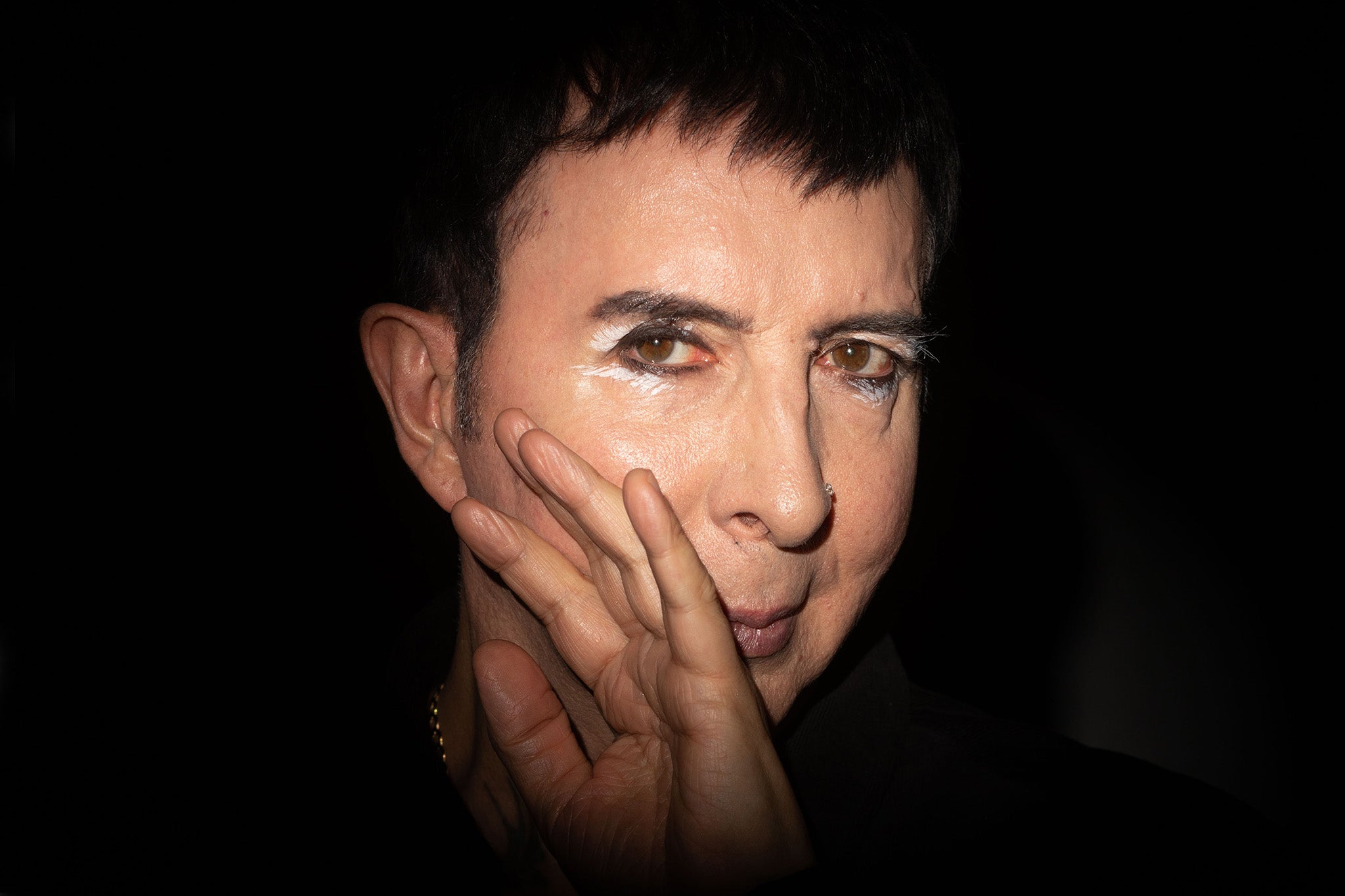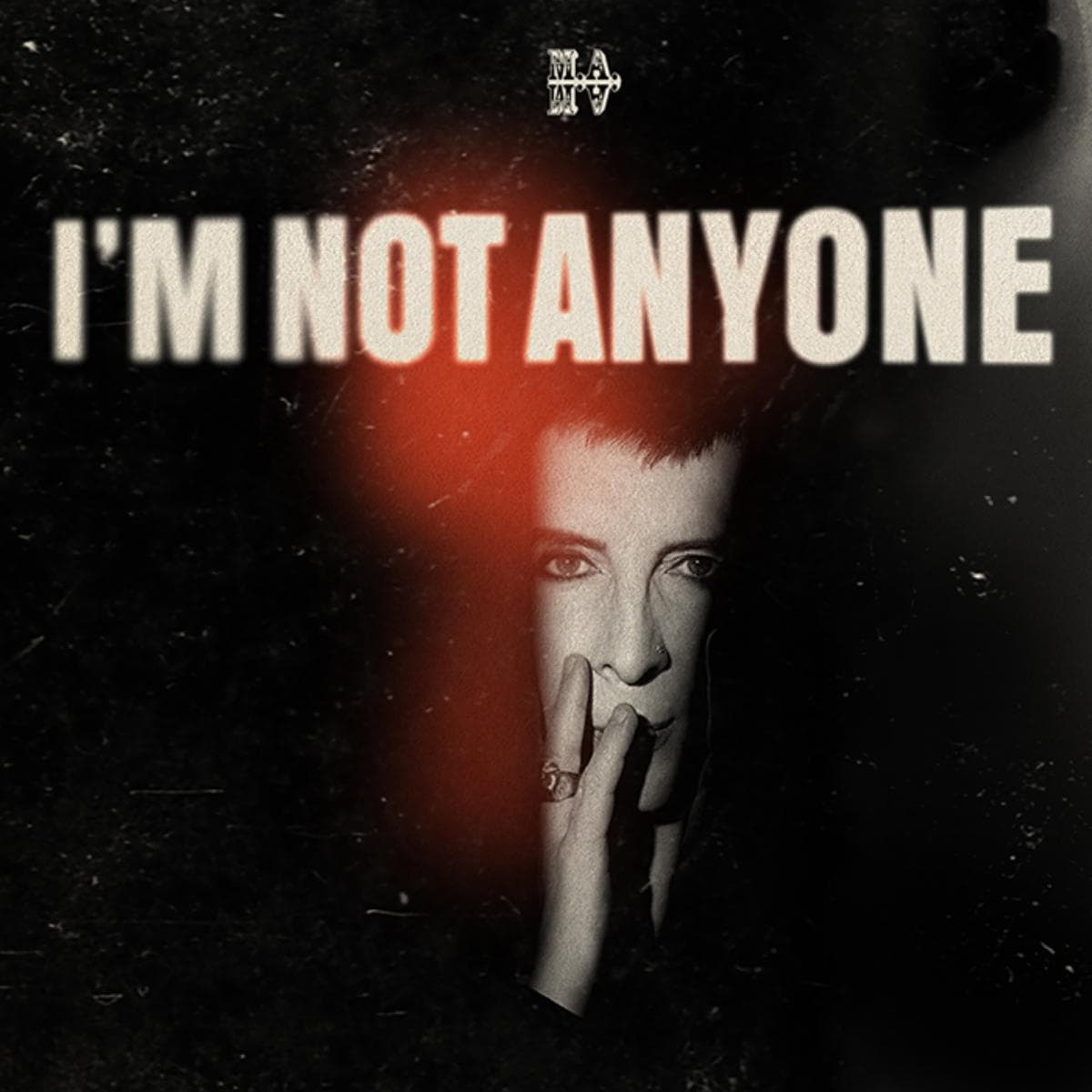Marc Almond: ‘I got a pin badge and – tah-dah! – I was a bona fide satanist!’
The Soft Cell singer tells Helen Brown about life under Vladimir Putin, his new hippy-influenced covers album, and why Just Stop Oil’s Stonehenge protest was an important pagan ritual


I’ve got LOADS of kaftans! I’ve always been a hippy.” Not words I’d expected to hear from Marc Almond. The Soft Cell frontman is still lodged in the popular imagination as a man cavorting through the Eighties in black studded leather and false eyelashes, sneer-flirting his way through songs like “Tainted Love”, “Say Hello, Wave Goodbye” and “Sex Dwarf”. But in his solo career, Almond shifted away from the sleaze synth that made his name to reinvent himself as a torch singer. His new album, I’m Not Anyone, is the third in a tender trilogy of covers albums. Lyrics about soft breezes and butterflies float over a soundscape of strummed acoustic guitar, flutes, sitar and tambourines.
“It’s all a bit druidy pagan, this record, isn’t it,” chatters Almond over the phone from the little farm he’s just bought in Portugal. “I spent all my savings on this place,” he says, “and I’m loving the rural life, planting things and getting back to nature.” If fans are surprised to hear he’s living the pastoral idyll, then so is he. “It’s a strange new experience for me,” he acknowledges, “because I’ve always been a city person. My songs have been set in cities, about urban nightlife. Dark, melancholic, a bit seedy. But I’m probably going to end up making really wholesome folk music now!”
Almond was born in Southport in 1957. He was based in London for years, but two things nudged him into his new lifestyle. Firstly, Covid had left his asthmatic lungs badly scarred. Secondly, the Russian invasion of Ukraine forced him to give up his second home in Moscow. “It’s so sad, just heartbreaking what is happening in Russia,” he says. “But I don’t think I can see myself ever going back to Moscow now. I think as an Englishman, and as an openly gay man, I’d just be too scared.”
Although Boris Yeltsin decriminalised homosexuality in Russia in 1993, things have gone backwards under Vladimir Putin’s regime. Proposals to reinstate Joseph Stalin’s 1934 ban were introduced three times in the early 2000s and, in 2013, Putin’s government brought in the federal gay propaganda law ostensibly aimed at protecting minors from being “enticed into a homosexual lifestyle”. By 2022 this extended to a ban on gay propaganda among all citizens, and in 2023 the LGBT+ movement was labelled as “extremist”, with the first convictions for displaying pride flags (“extremist symbols”) online handed out earlier this year.
Almond has witnessed the cultural shift first hand. His first tour of Russia, Siberia and the Baltic States was organised by the British Council back in 1992. “That was just after the iron curtain came down,” he recalls, “and I had an amazing trip with my pianist Martin Watkins.”
The Russian music Almond heard inspired him to make two albums with Russian musicians: the balalaika-flecked Heart on Snow (2003) and Orpheus in Exile (2009), on which he covered songs originally recorded by tenor Vadim Kozin (1903-1994). Although Kozin sang for Soviet troops during the Second World War (Winston Churchill was a fan), his homosexuality saw him exiled to a labour camp in 1944. He was released in 1950, but he was never exonerated and remained in exile. He later spoke of being so traumatised that he burned his own records, dying in the port city of Magadan, a former transit town for political prisoners in the far east of Russia, at the age of 91.
In a 2016 interview with The Guardian, Almond boggled at the mindset of his gay friends in Moscow. He said: “They kind of want to have this dictator... this person that tells them what to do. They all pay corrupt people under the table … there is that life there. I guess when you have this place that’s absolutely a gigantic collection of gangster states, it takes a monster to look after the monsters.”

It sounds like a state level version of S&M, I suggest today and Almond agrees: “Yes! It is! I haven’t been back since the invasion of Ukraine. But I was there for New Year’s Eve a few months before it all went to pot, singing at a party and having a great time.” He sighs. “Putin always comes on TV and does his big new year speech. It was very camp,” he chuckles. “But dictators are always really camp, aren’t they? All the self-portraits and posing. The fact they don’t know it makes them even camper!” He says that after Putin had “done his turn for the cameras”, the state television station broadcast a variety show. “There were drag queens on it. Honestly, these were the gayest people I have ever seen on TV. So utterly gay it was unbelievable. It’s the weirdest thing.”
Are his Muscovite friends still OK? “Yes, they do seem to be,” he says. “We stay in touch using encrypted apps like WhatsApp. Lots of my gay friends have left. But I have just spoken to a good gay friend who is still there. I asked: ‘Is everything being shut down?’ He said: ‘No, no, the gay clubs are still thriving, fantastic. We’re just celebrating the tenth anniversary of one famous Moscow gay club. Another club just opened.’ These places are all half a mile from the Kremlin! We don’t know what will happen next week or next month but for now it’s still a big party after dark. It’s still wild, gay Moscow.”
I suppose Putin is more focused on suppressing Ukrainian clubs right now? “Exactly,” says Almond. “It’s all very upsetting. Awful, what is happening in Ukraine. I hope not all Westerners blame the Russian people. Many of them are prisoners. They can’t say what they want, live the way they want. Those brave people who come out on the street and say what they think for Western journalists are extraordinary.”
My first thought was: oh dear, no. But the more I thought about it, the more appropriate that action seemed
Almond himself has always struggled to say what he thinks. A serious brain injury caused in a 2004 motorbike crash left him struggling for consistent empathy. But there were issues before his collision with the tarmac. He describes his Lancastrian childhood as “broken”, and at 17 he was sectioned for two months after a breakdown triggered by his parents’ divorce. “I’ve always suspected I’m on the autistic spectrum, although I have never been diagnosed,” he says. “I was always happy on the stage in my own little bubble. Separate from the audience but connecting to them on a deeper level. But off stage I don’t really relate to people generally in a lot of different ways. I’ve dreaded being in public, around lots of different people I don’t know.”
Television interviews have always caused a spike in anxiety. “I get really stressed and worried I might say anything that comes into my head at any moment. It’s like being a class clown at school. You get known for bad behaviour, being disruptive. You’re just trying to get people to like you and you’re terrified you’re going to say something really inappropriate at any minute.”
Almond admits that – “thank God!” – art has always been a safe place to stow his darker thoughts rather than blurting them out. Especially when he was struggling with bullying from “jealous homophobic” peers. They’ve been there all along, from his 1970s forays into post-punk at Leeds Polytechnic through Soft Cell’s classic 1981 album Non-Stop Erotic Cabaret to the masochism of songs like “Bad to Me” (2015).

Decades of heavy drug consumption also cushioned the stresses of celebrity. In his 1999 autobiography Tainted Life, he writes that “hardly a day of 1982 passed without me being on acid”. The pharmaceuticals fed into the kind of extreme theatricality that at one point saw Almond inducted into the San Francisco chapter of a satanist cult, just for giggles. “I got a pin badge,” he tells me today. “And – tah-dah! – I was a bona fide satanist!”
These days he’s less into psychedelics and goat skulls and more into standing stones and cheesecloth. “I’m into druidism. I’m a druid-lite,” he enthuses warmly. “The whole ethos of tuning into nature and history just seems like common sense to me. I got all the books and CDs. It’s something I’ve been really enjoying.”
It’s not been long since Just Stop Oil campaigners made a powdery orange protest at Stonehenge. Did Almond think that was sacrilege? “My first thought was: ‘Oh dear, no,’” he says. “But the more I thought about it, the more appropriate that action seemed. The protesters were drawing attention to the same issue of how our survival is connected to the planet that the druids would have been focused on. Making a statement about the climate by throwing natural powder at the stones actually sounds like a pagan ritual to me.”

This kind of ritual hope dances through the new album. Having struggled through the pandemic himself, Almond wanted to “give a sense of light coming through the darkness”. And as he has “often felt weighted down by my own songs”, he felt something lift in throwing his heart and scarred lungs into the 12 vintage covers by the likes of Neil Diamond, Colin Blunstone, Bob Lind and King Crimson. There is also a spritely cover of “Gone with the Wind Is My Love”, previously recorded by Gloria Jones, whose recording of “Tainted Love” inspired Soft Cell’s hit version.
Almond hasn’t tinkered with the songs much, although he says he couldn’t stick to the Christian lyrics of Mahalia Jackson’s gospel classic “Trouble of the World”. “That’s probably one of my favourite songs of all time,” swoons Almond. “I first saw it in a movie called Imitation of Life, directed by Douglas Sirk – a Lana Turner melodrama. There are racial themes in the movie but at the end, in a funeral scene, Jackson pops up and starts singing that song. If I even think about that scene I burst into tears. But I couldn’t sing her line ‘I wanna go home to God’ with any conviction so I changed the lines so they’re about finding peace in a troubled world.”
Has Almond found his own peace? “In some ways, yes,” he says. “But there’s a contradiction in how you want to live at my age. On the one hand, you want to slow down, relax and enjoy the garden. On the other hand, the awareness that you may not have many active years left makes you want to do as much as you possibly can before you can’t do it any more!”
‘I’m Not Anyone’ is available now






Join our commenting forum
Join thought-provoking conversations, follow other Independent readers and see their replies
Comments